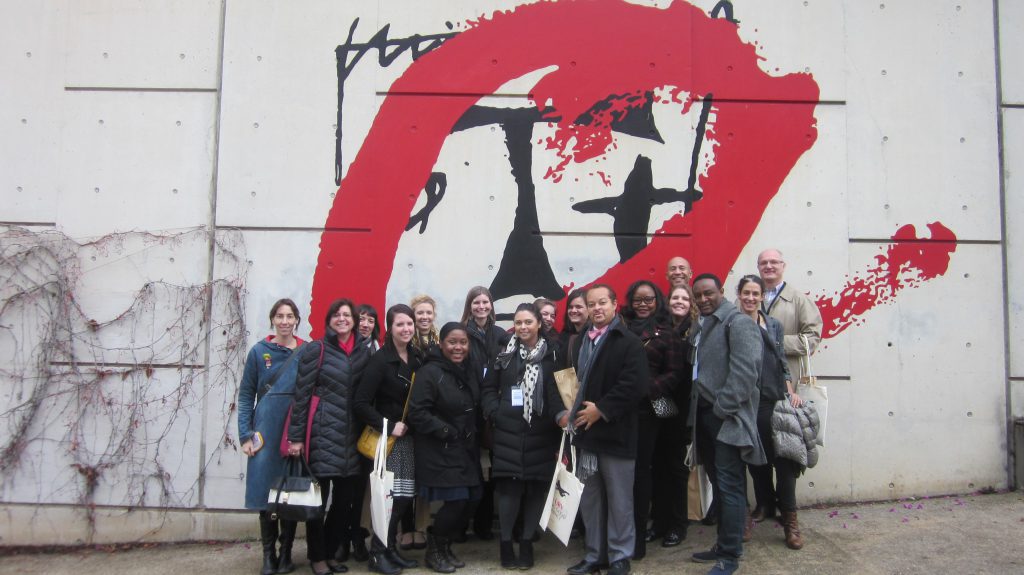14/12/2018 Opinion

Marina Casals, head of the International Center of URV
When the internationalization of the URV goes hand in hand with that of the region
It is in our hands to take advantage of the opportunities and benefits of this process.

It is in our hands to take advantage of the opportunities and benefits of this process.
The Universitat Rovira i Virgili works towards the internationalization of its entire university community, that is, for its students, teachers, and administration and services staff and others. If we only focus our efforts on internationalizing the URV community, we will overlook our duty to wider society. Our students, our teachers and all URV staff have families, friends, neighbours and therefore the URV’s mission to internationalize should serve society in best possible way.
This vision led to the URV’s first Strategic Plan for Internationalization, whose proud subtitle was “Opening doors to the world and the region”. In its introduction, the then rector Francesc Xavier Grau stressed out that internationalization and regional development are not exclusive, but rather can dovetail perfectly with one another:
The internationalization of the university is not only fully compatible with its regional impact, it is also one of its principal benefits (…). The URV has committed itself to becoming a more international institution both in research and in teaching by means of the internationalization of its staff and students. That is, the university is seeking to increase its international visibility and impact whilst maintaining an identity that is strongly rooted in its region, convinced that the international nature of its activities also contributes decisively to the development of the region. This strong territorial base provides us with an academic activity that is unique and that reinforces society and the economy, and this in turn means that as a university and as a region we can occupy a prominent position in the global knowledge society.
Consequently, we agree that internationalization is as much for our university as for our society. However, it is important to make a couple of observations. The first is that internationalization is not an objective in itself, but rather it is a means to achieve higher quality teaching, research and transfer. The second observation is a question of semantics: is it better to say internationalization OF, WITH or TO instead of internationalization FOR?
OF: Global internationalization of the URV is not only a part of our institution. As John Hudzik, the father of comprehensive internationalization theory, says:
Comprehensive internationalization is a commitment, confirmed through action, to infuse international and comparative perspectives throughout the teaching, research, and service missions of higher education. It shapes institutional ethos and values and touches the entire higher education enterprise. It is essential that it be embraced by institutional leadership, governance, faculty, students, and all academic service and support units. It is an institutional imperative, not just a desirable possibility.
Comprehensive internationalization not only impacts all of campus life but the institution’s external frames of reference, partnerships, and relations. The global reconfiguration of economies, systems of trade, research, and communication, and the impact of global forces on local life, dramatically expand the need for comprehensive internationalization and the motivations and purposes driving it.
WITH: Everyone must be involved, since the process of internationalization, as we have just seen is an international process. At the URV we want all our members to be involved in the process and from this desire has emerged the SUCTI project (www.suctiproject.com) [1], an acronym of Systemic University Change Towards Internationalization. The SUCTI’s goal is to train community members to understand what internationalization is, what the URV is doing about it, what the global trends in Higher Education are and how can they participate from their worksite in this process. Through these trainings, we would motivate internal change to internationalization providing as well communication and informative action that can show what is already done, which is a lot. For this reason, we launch a newsletter that includes a large part of internationalization activities (http://www.urv.cat/international/vivir-urv/en_urvinternationalnewsletter.html) along with other activities such as the publication of Comprehensive internationalisation at the URV: Examples of good practices at the Universitat Rovira i Virgili [2], edited on the occasion of 25th URV’s anniversary.
FOR: For the benefit of the URV and beyond. That is, for the benefit of our entire society.
To illustrate what internationalization really is, the image of the castellers (human towers) was chosen, which is a traditional activity from the Southern Catalonia Region and which is accompanied by the phrase “Internationalization for everyone”. The reason why this image was chosen it is that the success of a human tower depends on the contribution of each casteller. Likewise, the contributions of each member of a university are essential to its internationalization process.
While it is true that internationalization is not free of difficulties, what is the alternative? Is it possible not to internationalize? The reflection I would like to make about this is: can we live in isolation? Our world is increasingly global, our students work in international contexts, mobility increases as travel becomes easier and distances are reduced. Everything goes faster and is more interconnected and it would be futile to try to stop this train.
Indeed, we have integrated into our region the benefits and challenges of tourism, but perhaps we do not see the impact of international students that visit us from all over the world. Moreover, the impact of their families who may visit them or who just look on from the distance, the visiting professors who come a few days to teach, researchers who collaborate in projects, institutional visits…all of them absorb a small part of our region into their life experiences.
Consequently, it would not make sense to oppose the unstoppable progress of the internationalization of our institution and our region, and, of course, of the world. However, it is in our hands to take advantage of the opportunities and benefits of this process.
The internationalization of the URV must go hand in hand with that of the region so that both can advance together and build a fabulous castell that contributes to the social development that we want.
REFERENCES
Universitat Rovira i Virgili (2010). Pla Estratègic d’Internacionalització / Strategic Internationalization Plan. [3]
Hudzik, John K. (2011). Comprehensive Internationalization. From Concept to Action. NAFSA.
—
[1] For more articles and information on the SUCTI project, see: https://suctiproject.com/events/articles-and-publications-2/
[2] VV.AA., Comprehensive internationalisation at the URV: Examples of good practices at the Universitat Rovira i Virgili, Publicacions URV, 2017 http://publicacions.urv.cat/cataleg/universitat-rovira-i-virgili/31-universitat-rovira-i-virgili/659-comprehensive-internationalisation-at-the-urv
[2] Strategic Internationalization Plan 2009-2013, Universitat Rovira i Virgili http://www.urv.cat/media/upload/arxius/pei/pei_en.pdf . Strategic Internationalization Plan 2014-2019 http://www.urv.cat/media/upload/arxius/pei/pei_angles.pdf
